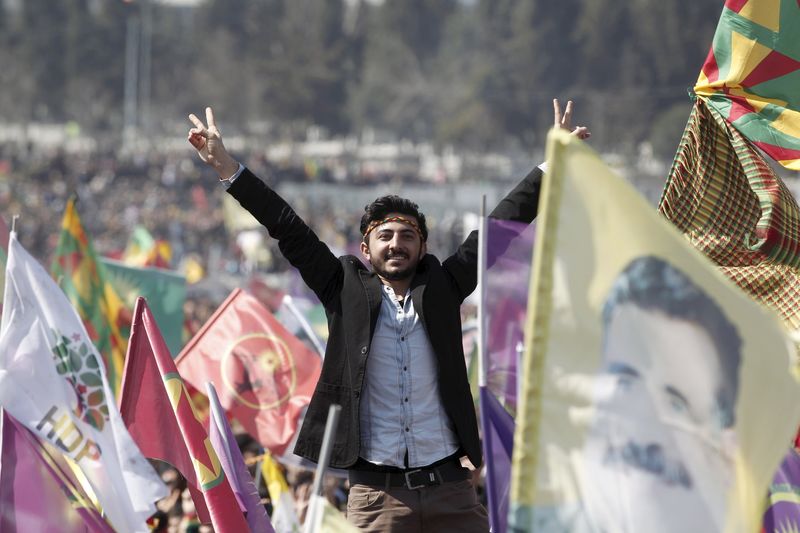By Daren Butler
DIYARBAKIR, Turkey (Reuters) - Ending the Kurdish insurgency in Turkey's impoverished southeast would unlock trade with Iran, Iraq and eventually Syria, and kick-start a local economy long left behind by the rest of the country.
Jailed Kurdish militant leader Abdullah Ocalan said last month it was time to end a three-decade armed struggle that has killed 40,000 people and stunted development in the region, bringing the prospect of peace closer.
This has raised hopes of regeneration in an area where household incomes are half the national average but which is rich in farmland, marble quarries and potential shale gas deposits and is close to Middle Eastern export markets.
"The southeast is very fertile for agriculture and has great potential. Businessmen come here looking to invest but are reluctant to commit themselves until peace takes root," said Ahmet, 45, who runs a bookshop by the 11th century Grand Mosque in the main regional city of Diyarbakir.
Talks between Ocalan's Kurdistan Workers Party (PKK) and the state, which were first launched more than two years ago, remain delicate and any peace dividend is likely to come only slowly.
Mutual distrust runs high and many locals are sceptical about the government's ability to fuel growth in a region whose economy feels out of synch with other parts of Turkey.
New malls lend a semblance of prosperity to parts of Diyarbakir, a city of anonymous apartment blocks which have sprung up beyond its Byzantine-era walls. But it is little more than a veneer.
"I was finished off by banks and money lenders. There's no economy, no factories. Now I just kill time here like everyone else," said Atilla, a 48-year old building contractor sitting by the food court of one of the shopping centres.
PLAYING CATCH UP
Official unemployment in the region is around 16 percent but local business people say that ignores the tens of thousands involved in seasonal jobs and not registered as actively seeking work. The real jobless rate is nearer 40 percent, they say.
Livestock farming, once an economic mainstay, was devastated by the conflict which began in 1984 when the PKK launched its armed insurgency. Insecurity was at its worst in rural areas, hindering both agriculture and the development of the mining sector.
Investment bank JP Morgan said after a visit to Turkey last month that its clients felt the country "needed new stories to attract fresh capital" and cited a potential economic revival in the Kurdish region as one example.
"The completion of the Kurdish peace process and the income catch-up that could follow in eastern Turkey along with the potential in Iranian and Syrian markets ... are regarded as some of the key potential stories," it said in a note.
The region once provided a third of Turkish marble exports to China, a level which has now fallen to around a fifth.
The government points to investments in the region.
Prime Minister Ahmet Davutoglu last month unveiled a $10 billion (7 billion pound) package to revive a decades-old plan to boost hydroelectric power production, irrigation and agriculture, known as the Southeast Anatolian Project (GAP).
"This great level of development (as a result of GAP) would be an inspiration and source of strength for Syria and Iraq one day when the ongoing violence disappears in those countries," he said in a speech in the southeastern city of Mardin.
"THIRSTY FOR PEACE"
The ruling AK Party says it has also pumped 13.9 billion lira ($5.4 billion) into infrastructure, housing, agriculture, education and health in Diyarbakir province alone during its 12 years in power.
It says southeastern exports have risen more than ten-fold to some $10 billion, although critics say two thirds of that trade comes from Gaziantep province further west, little touched by the conflict with the PKK. In Diyarbakir province, with a population of 1.6 million, exports were $313 million last year.
"We think positive discrimination should be applied, with serious public investments like in other regions. This would reduce unemployment, poverty, regional backwardness and income inequality," said Diyarbakir co-mayor Firat Anli.
A ceasefire called two years ago has largely held but isolated unrest has continued, with militants burning vehicles and taking hostage workers connected to state construction projects, such as military outposts, airports and dams.
Dozens of people were killed last October in protests triggered by Kurdish anger at Turkey's perceived inaction as Islamic State militants besieged the Kurdish town of Kobani just across the border in Syria.
"This is a region thirsty for peace for 30 years. The two years of the process eased the tension and people started to invest. But the trouble put everything on hold again," said Alican Ebedinoglu, head of a local business association.
